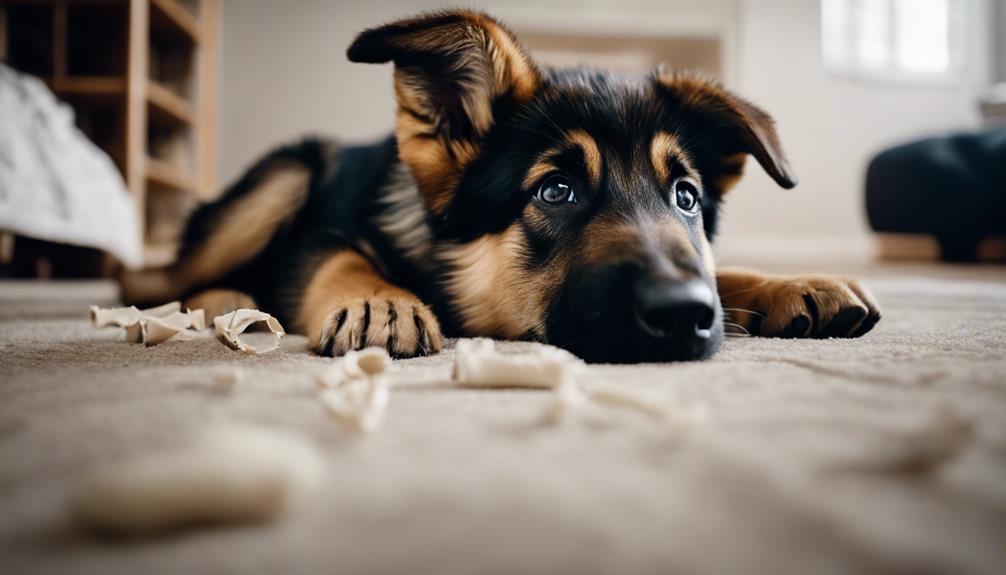🐾 Paw-some Partnership Alert! 🐾
As a pack of German Shepherd enthusiasts at MixGermanShepherd.com, we're always sniffing out the best products for our furry friends. Guess what? When you fetch something from Amazon through our links, we earn a little treat! 🦴
Imagine a playful German Shepherd mix puppy bounding around your home, but suddenly, behavioral issues arise. Nipping, separation anxiety, and excessive barking can be common challenges. How can you effectively address these issues as they develop in your furry companion? Stay tuned to discover practical solutions and insights to guide you through shaping positive behaviors and fostering a strong bond with your German Shepherd mix pup.
Key Takeaways
- Training and socialization are crucial for addressing common behavioral issues in German Shepherd mix puppies.
- Positive reinforcement, consistency, and mental stimulation play vital roles in behavior modification.
- Early acclimation to alone time and proper socialization can prevent territorial aggression.
- Solutions include gradual desensitization, recognizing signs, seeking professional help, and building routines for separation anxiety.
Behavioral Issues in German Shepherd Mixes
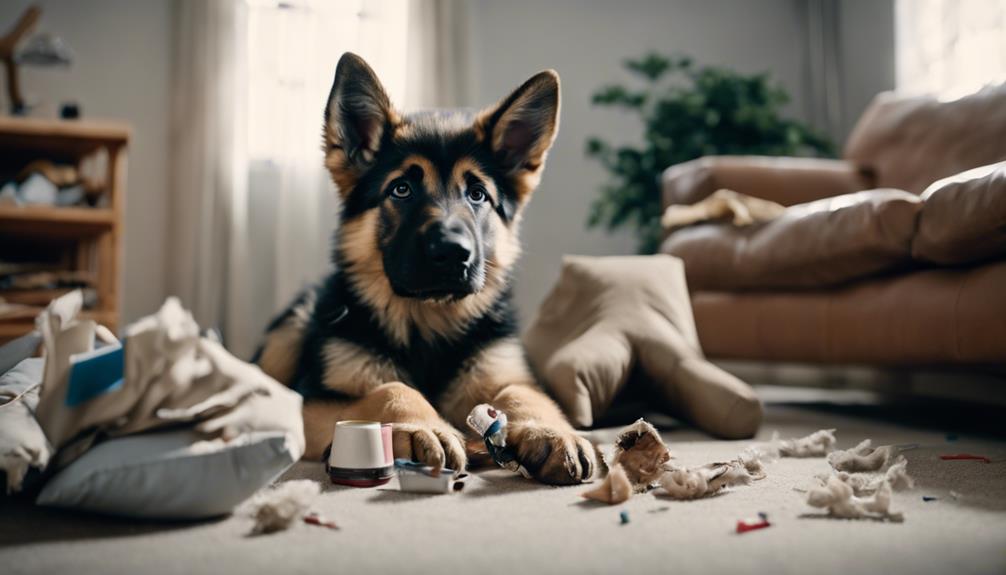
Understanding the behavioral issues in German Shepherd mixes is essential for effectively addressing and managing their diverse range of behaviors. German Shepherd mixes, like any other breed, can exhibit separation anxiety, territorial aggression, and excessive barking. To tackle these issues, training and socialization are vital. Positive reinforcement, consistent training, and mental stimulation play significant roles in shaping the behavior of German Shepherd mix puppies. When addressing separation anxiety, it's important to gradually accustom your pup to being alone by practicing short absences and rewarding calm behavior. Socialization from an early age helps prevent aggressive tendencies and promotes good behavior around other dogs and people. Providing mental stimulation through interactive toys, puzzles, and training activities can help channel their intelligence and energy positively. By understanding and addressing these behavioral issues with patience and consistency, you can help your German Shepherd mix develop into a well-adjusted and happy companion.
Aggression in German Shepherd Mixes
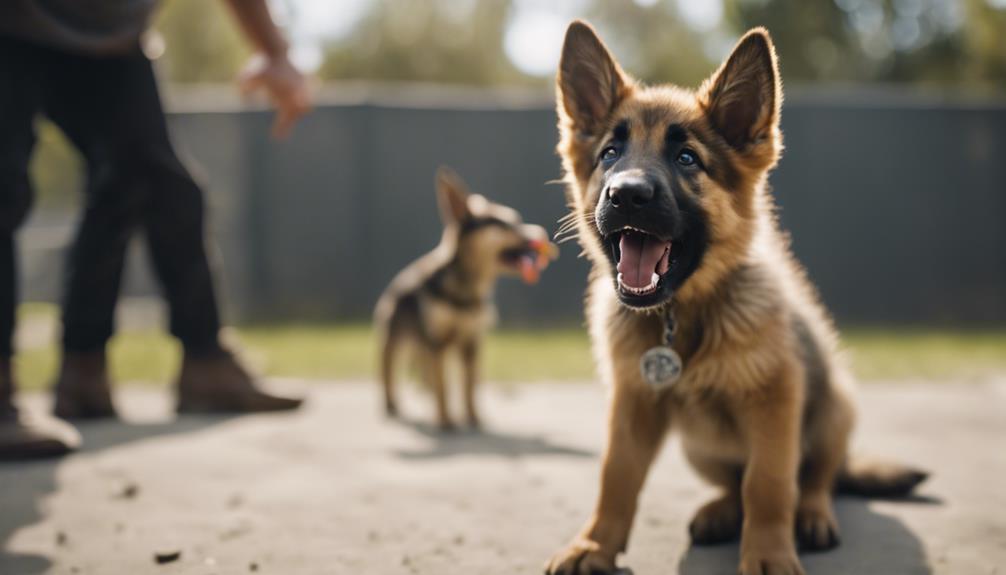
Aggression in German Shepherd mix puppies can manifest due to genetic factors, lack of socialization, fear, or resource guarding tendencies. When dealing with aggression in your German Shepherd mix, consider the following:
- Early Training and Socialization: Proper training and socialization from a young age are crucial in addressing and preventing aggression in German Shepherd mixes.
- Positive Reinforcement: Utilize positive reinforcement techniques to encourage good behavior and discourage aggressive tendencies in your German Shepherd mix puppy.
- Seek Professional Guidance: Consult with professional trainers or behaviorists who specialize in working with aggressive behavior in dogs to effectively manage and modify your German Shepherd mix's aggression.
- Understanding Behavior Patterns: Take the time to understand your individual dog's triggers and behavior patterns to tailor a specific plan that addresses the aggression in your German Shepherd mix puppy.
Leash Pulling Problems
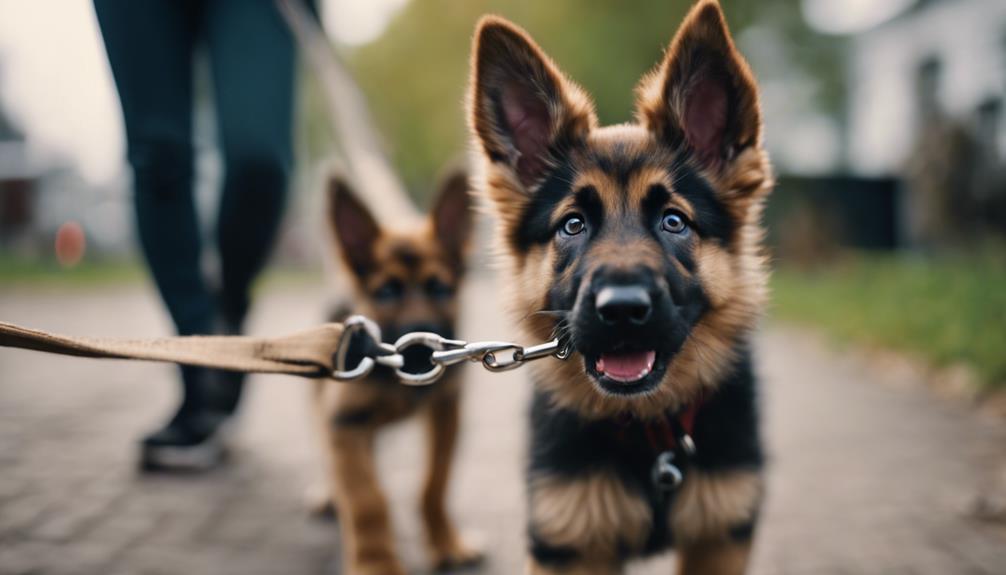
Dealing with leash pulling problems in your German Shepherd mix puppy requires consistent training and patience to effectively address this common issue. German Shepherd mix puppies, known for their energetic and strong nature, may exhibit leash pulling behavior if not properly trained and socialized during puppyhood. To tackle this issue, consider using positive reinforcement training techniques that reward your puppy for walking nicely on a loose leash. Additionally, using a front-clip harness can help redirect your puppy's attention and discourage pulling. Consistent training is key to instilling good leash manners in your furry companion. Remember to be patient and understanding throughout the training process. By reinforcing positive behaviors and providing gentle guidance, you can help your German Shepherd mix puppy learn to walk politely on a leash. Socialization and ongoing training will play a crucial role in overcoming leash pulling problems, ensuring enjoyable walks for both you and your puppy.
Nipping and Biting Solutions
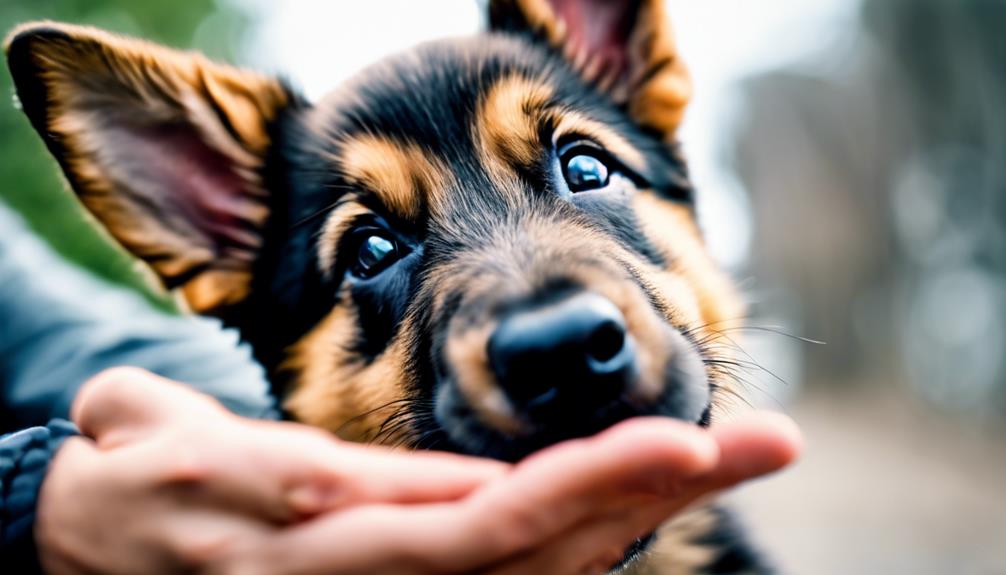
To address nipping and biting behaviors in your German Shepherd mix puppy, redirect their attention towards appropriate toys and provide chew toys to discourage biting tendencies. Here are some practical solutions to help you tackle this common issue:
- Redirect Attention: When your puppy starts nipping or biting, calmly redirect their focus onto a suitable toy. This helps them understand what is acceptable to chew on.
- Chew Toys: Offer a variety of chew toys that are safe and durable for your puppy to gnaw on. This can satisfy their natural urge to chew and reduce the likelihood of them biting you or others.
- Training Techniques: Consistent training using positive reinforcement methods can teach your German Shepherd mix puppy proper bite inhibition. Reward good behavior to reinforce positive habits.
- Socializing: Encourage socialization with other dogs and people to help your puppy learn appropriate play behaviors. Interaction with different individuals can also reduce nipping tendencies over time.
Dealing With Separation Anxiety
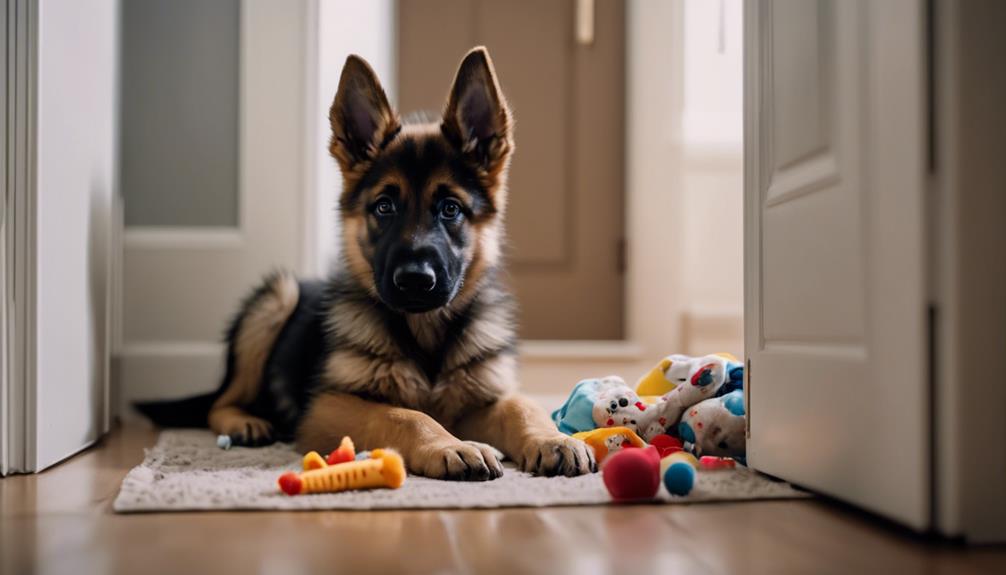
If your German Shepherd mix puppy shows signs of separation anxiety like excessive barking or destructive behavior, don't worry, there are effective coping strategies to help. Gradual desensitization techniques and providing mental stimulation through interactive toys can make a significant difference in alleviating their distress. Remember, severe cases might require professional assistance, so don't hesitate to seek help if needed.
Separation Anxiety Signs
Separation anxiety signs in German Shepherd mix puppies manifest through behaviors like excessive barking, destructive tendencies, and escape attempts. When your puppy experiences separation anxiety, you may notice the following signs:
- Clingy behavior towards you or family members.
- Pacing or restlessness when left alone.
- Howling or whining for extended periods.
- Destructive chewing on furniture, walls, or door frames.
It's crucial to address these signs promptly to help your furry friend feel more at ease. Providing comforting items, gradual desensitization to being alone, and seeking professional help if needed are all essential steps in managing separation anxiety in German Shepherd mix puppies. Remember, patience and understanding go a long way in supporting your puppy through this challenging time.
Effective Coping Strategies
When helping your German Shepherd mix puppy cope with separation anxiety, incorporating gradual desensitization techniques can be highly effective. Start by leaving your puppy alone for short periods and gradually increase the time to help them adjust. Providing mental stimulation and interactive toys can also keep them occupied while you're away. If your puppy shows symptoms like excessive barking, destructive behavior, or house soiling, remain patient and consistent in your approach. Building a routine and creating a safe, comfortable space can help alleviate their anxiety. In severe cases, seeking professional help may be necessary to develop a tailored plan for your German Shepherd mix puppy's specific needs.
Handling Protective Behavior
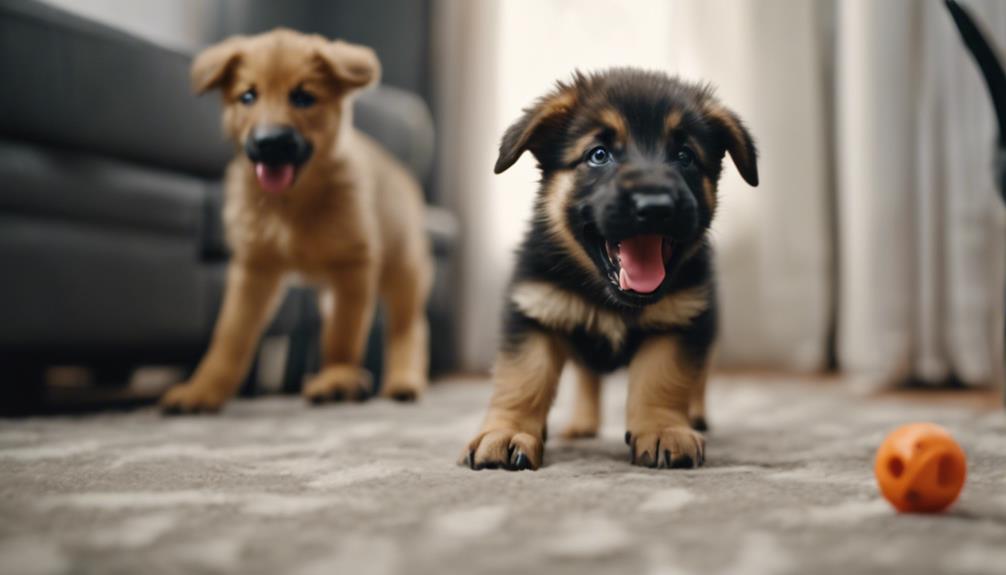
When tackling protective behavior in your German Shepherd mix puppy, remember to set boundaries firmly to establish leadership. Socialize your puppy carefully from a young age to help them distinguish between real threats and normal situations. Utilize positive reinforcement training techniques to encourage desired behaviors and discourage overprotectiveness.
Setting Boundaries Firmly
To effectively handle protective behavior in your German Shepherd mix puppy, establish clear boundaries early on to set expectations and promote positive behavior. Here are some practical tips to help you navigate this behavior:
- Consistent Training: Regular training sessions will reinforce boundaries and expectations.
- Socialization: Expose your puppy to various environments and people to help them distinguish real threats from everyday situations.
- Reward-Based Training: Use positive reinforcement to encourage good behavior and discourage excessive protectiveness.
- Firm Boundaries: Be firm and consistent in setting limits to prevent your puppy from becoming overly protective.
Socialization With Care
Establishing trust through gradual exposure and positive interactions is key when socializing your German Shepherd mix puppy to manage their protective behavior effectively. Proper socialization plays a crucial role in helping your puppy differentiate between real threats and normal situations. By introducing your puppy to a variety of people, animals, and environments in a positive manner, you can help reduce their overprotective tendencies. Utilizing positive reinforcement training techniques will further aid in shaping your puppy's behavior. Consistent socialization and training will assist your German Shepherd mix in becoming a well-adjusted and balanced adult dog. Remember, patience and understanding are vital as you work to address and manage your puppy's protective instincts through proper socialization methods.
Positive Reinforcement Training
Utilizing positive reinforcement training techniques can help shape your German Shepherd mix puppy's behavior and effectively manage their protective tendencies. Here are some tips to assist you in reducing unwanted behavior and fostering a strong bond through positive reinforcement training:
- Rewarding Behaviors: Acknowledge and reward your puppy when they exhibit desirable behaviors such as staying calm in protective situations.
- Consistency is Key: Be consistent in rewarding good behavior to reinforce the desired actions consistently.
- Patience and Persistence: Training takes time, so be patient and persistent in teaching your puppy what behaviors are acceptable.
- Seek Professional Help: If you are struggling with managing your puppy's protective behavior, seek guidance from a professional trainer experienced in positive reinforcement techniques.
Curbing Fierce Aggression
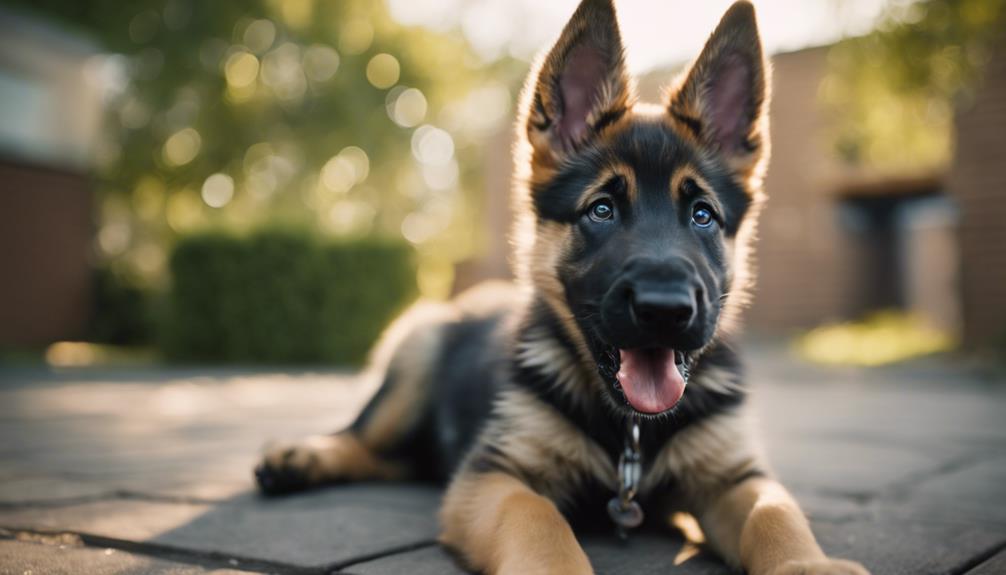
When addressing fierce aggression in German Shepherd mix puppies, it's crucial to establish clear boundaries and provide consistent leadership. German Shepherd mix puppies may exhibit aggressive behaviors stemming from their protective instincts and heritage. To manage this aggression, early socialization and positive reinforcement training are key. Understanding the root cause of the aggression is vital for effective behavior modification. If aggressive behaviors persist or escalate, seeking professional help is advisable. Consistent leadership, clear boundaries, and proper training techniques play a significant role in curbing fierce aggression in German Shepherd mix puppies.
| Curbing Fierce Aggression | |||
|---|---|---|---|
| Establish Clear Boundaries | Provide Consistent Leadership | Early Socialization | Positive Reinforcement Training |
| Set limits for behavior | Be a calm and assertive leader | Expose your puppy to various environments | Reward good behavior consistently |
| Avoid reinforcing aggressive behavior | Guide and redirect your puppy's actions | Encourage positive interactions with people and other animals | Use treats and praise to reinforce desired behaviors |
| Consistency is key | Lead by example | Help your puppy feel comfortable in different situations | Build a strong bond through positive experiences |
Addressing Leash Pulling
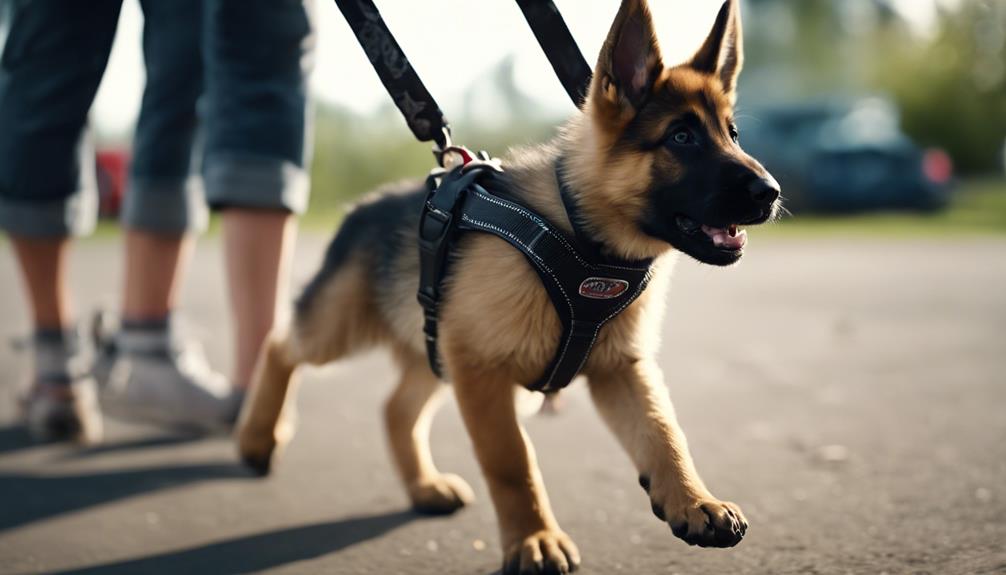
To effectively address leash pulling in German Shepherd mix puppies, consistent training techniques and positive reinforcement are essential. Here are some practical steps to help you tackle this behavior:
- Start Early: Begin leash training as soon as possible to prevent leash pulling habits from forming in your German Shepherd mix puppy.
- Use Rewards: Encourage good behavior by rewarding your puppy with treats or toys when they walk calmly on the leash without pulling.
- Short Training Sessions: Engage in brief but frequent training sessions to teach your puppy proper leash manners and reinforce positive behaviors.
- Seek Professional Help: If leash pulling persists despite your efforts, consider consulting professional trainers or behaviorists for additional guidance and support.
Solutions for Nipping and Biting
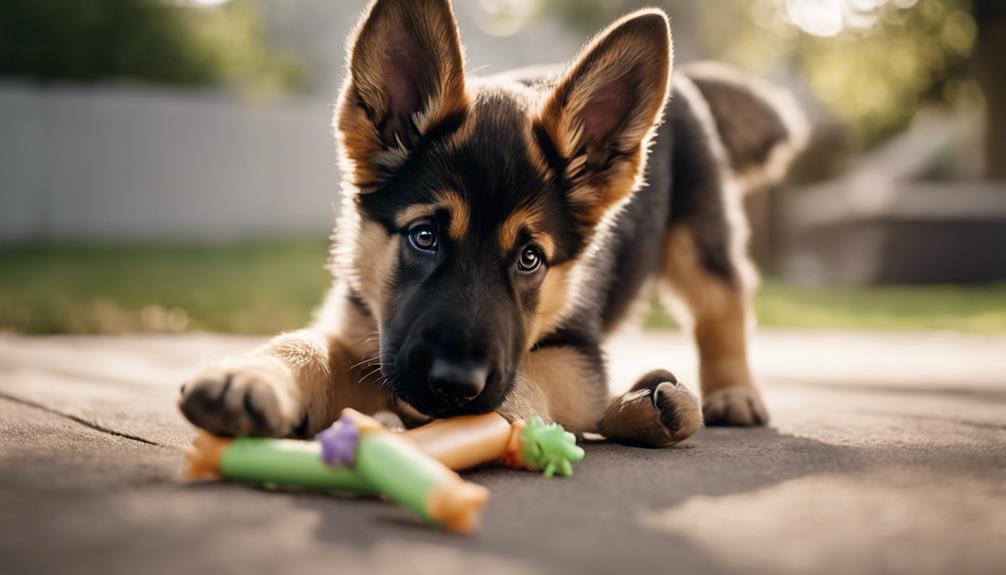
To guide your German Shepherd mix puppy away from nipping and biting behaviors, focus on redirection techniques and early socialization efforts to foster appropriate play habits. German Shepherd mix puppies may nip and bite due to their herding instincts, but you can help curb this behavior. Provide your puppy with suitable chew toys to teach them bite inhibition. Additionally, socialize your puppy early on to ensure they learn proper play behaviors and reduce their nipping tendencies. Consistency is key; discourage nipping and biting by yelping when they do so or using a time-out method to show that such behavior is not acceptable. If these methods do not yield the desired results, consider seeking professional training assistance to address persistent nipping and biting behaviors in your German Shepherd mix puppy. By implementing these strategies, you can help your puppy develop into a well-behaved and gentle companion.
Managing Separation Anxiety
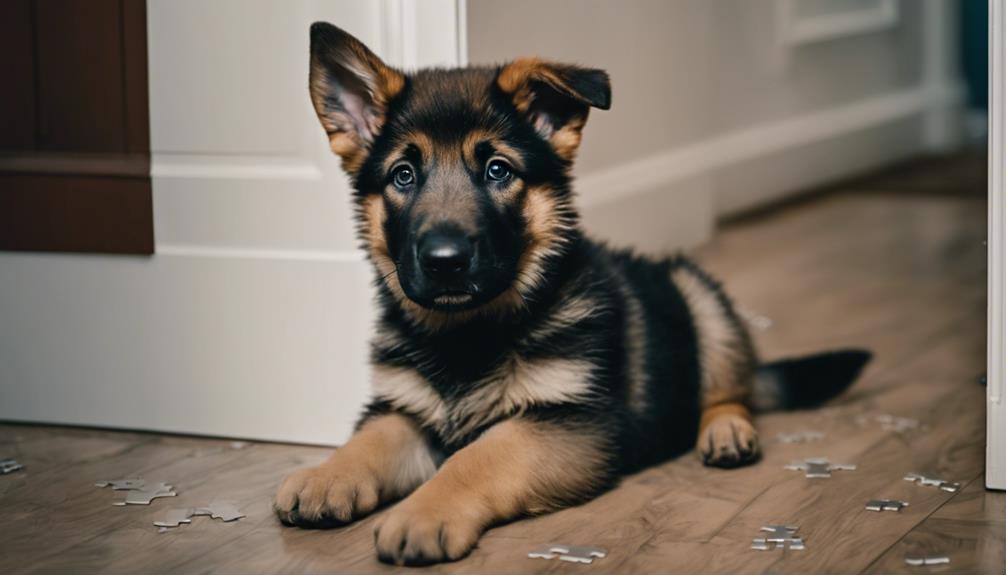
If your German Shepherd mix puppy struggles with separation anxiety, consider implementing alone-time training techniques and enrichment activities to provide relief. Gradual desensitization can help them become more comfortable with being alone, while mental stimulation through interactive toys can keep them occupied. Professional help may be needed for severe cases, so don't hesitate to seek guidance if necessary.
Alone-Time Training Techniques
When helping your German Shepherd mix puppy overcome separation anxiety, focus on implementing gradual desensitization techniques to ease their transition to being alone. Here are some tips to help your puppy adjust:
- Start Small: Begin by leaving your puppy alone for short periods and gradually increase the time as they become more comfortable.
- Provide Mental Stimulation: Use interactive toys or puzzles to keep your puppy engaged and mentally active during alone time.
- Avoid Emotional Departures: Keep goodbyes low-key to prevent reinforcing anxiety behaviors in your puppy.
- Seek Professional Help: If your puppy continues to struggle with separation anxiety, consider consulting a professional trainer or behaviorist for additional support.
Enrichment Activities for Relief
Ease your German Shepherd mix puppy's separation anxiety by incorporating enriching activities that provide relief and comfort during your absence. Engage your puppy with puzzle toys, interactive feeders, and engaging toys to keep them mentally stimulated. Before leaving, offer treats and interactive games like hide and seek to distract and calm your anxious pup. Consider leaving a piece of clothing with your scent to provide familiarity. Additionally, engaging in daily training sessions and mental stimulation exercises can help reduce separation anxiety in your furry friend. Check out the table below for some examples of enrichment activities:
| Enrichment Activities | Description | Benefits |
|---|---|---|
| Puzzle Toys | Toys that dispense treats when solved | Mental Stimulation |
| Interactive Feeders | Feeders that require active participation | Distracts and Calms |
| Engaging Toys | Toys that keep your puppy entertained | Prevents Boredom |
| Treats | Special snacks to reward and comfort | Positive Association |
| Interactive Games | Games like hide and seek to engage | Alleviates Stress |
Frequently Asked Questions
Why Is My German Shepherd so Badly Behaved?
Feeling frustrated with your German Shepherd's behavior? Consider training techniques, socialization tips, and exercise requirements. Provide mental stimulation, positive reinforcement, and consistent discipline while understanding breed characteristics. Patience and guidance can lead to positive changes.
How Do You Calm Down a German Shepherd Puppy?
To calm down your German Shepherd puppy, use positive reinforcement, establish an exercise routine, provide mental stimulation, maintain consistent training, work on socialization skills, and practice calming techniques. Be patient and understanding as you guide your puppy.
How Do You Deal With an Aggressive German Shepherd Puppy?
To deal with an aggressive German Shepherd puppy, focus on positive reinforcement, professional training, socialization, exercise/play, consistent leadership, behavior modification, and patience/consistency. Seek help if needed. Your calm approach and guidance will help the pup thrive.
Why Is My GSD Puppy so Bad?
Feeling overwhelmed by your GSD puppy's behavior? Consistent puppy training, socialization techniques, and exercise routines can make a big difference. Remember, positive reinforcement, mental stimulation, behavioral classes, and professional help are all valuable resources to guide you through this journey.
Conclusion
You've learned valuable strategies to address common behavioral issues in German Shepherd mix puppies. By using positive reinforcement and patience, you can help your puppy overcome nipping, separation anxiety, and excessive barking. Remember, training is a journey that requires consistency and understanding. With your commitment and love, you can guide your puppy towards better behavior and a stronger bond between you both. Keep up the great work, and enjoy the rewarding experience of raising a well-behaved companion!
